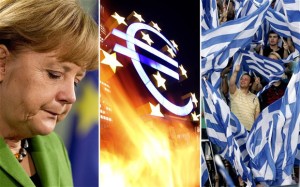 Dialogos is excited to present, in its first publication worldwide, the latest by investigative reporter and bestselling author Greg Palast on Greece, SYRIZA, and the upcoming elections. Palast’s book, “Vultures’ Picnic,” will soon be released in a Greek edition by Livanis, while the Greek version of this article was published on Sunday, January 18 in the newspaper “To Xoni.” Dialogos Radio will air, as part of our coverage of the Greek election, an interview with Palast on our upcoming broadcast.
Dialogos is excited to present, in its first publication worldwide, the latest by investigative reporter and bestselling author Greg Palast on Greece, SYRIZA, and the upcoming elections. Palast’s book, “Vultures’ Picnic,” will soon be released in a Greek edition by Livanis, while the Greek version of this article was published on Sunday, January 18 in the newspaper “To Xoni.” Dialogos Radio will air, as part of our coverage of the Greek election, an interview with Palast on our upcoming broadcast.
Trojan Hearse: SYRIZA’s fantasy of the euro without austerity
By Greg Palast
SYRIZA wants to cure Greece of leprosy, but wants Greece to remain in the leper colony. That is, SYRIZA wants to rid Greece of the pain of austerity but insists on staying in the euro zone.
The problem is, austerity is merely a symptom of an illness. And the disease is the euro itself.
For the last five years, Greeks have been told that, if you cure your disease—that is, if you dump the euro—the sky will fall. I guess you haven’t noticed, the sky has already fallen. With unemployment at over 25%, there is no further to fall.
In 2010, when unemployment was a terrible 10%, the “troika” promised that tough austerity measures will restore your economy by 2012.
Ask yourself, was the troika right?
There is a saying in America: Fool me once, shame on you. Fool me twice, shame on me.
Can Greece survive without the euro? You’re already dead. You are ghosts. You are told that if Greece leaves the euro and renounces its debts, it will not be able to access world capital markets. The reality is, you can’t access world markets now: no one lends to ghosts.
Many nations do quite well without the euro. Sweden, Denmark and Bangladesh do just fine without the euro—and so does,Turkey, which had the luck to be excluded from the eurozone. As long as Turks stick to the lira, even a brain-damaged Islamo-fascist like Tayyip Erdoğan cannot destroy their economy.
Can you dump the euro? You have happy precedents to follow. Argentina’s currency was once tied to the US dollar, similarly to how Greece is tied the euro today.* In 2000, Argentines, hungry and angry, revolted. Argentina ultimately overthrew the dollar dictatorship, the IMF diktats and the threats of creditors, and defaulted on its dollar bonds with a laugh. The Argentine economy has soared since. While Argentina is today under attack by financial vultures, it is only because the nation became so temptingly wealthy.
I was in Brazil when its President Luiz Inácio Lula da Silva told the IMF to go to hell—and rejected privatization of the state banks and state oil company, rejected cutting pensions and thumbed his nose at the rest of the austerity nonsense. Instead, Lula created the bolsa familia, a massive pay-out to the nation’s poor. The result: Brazil not only survived but thrived during the 2008-10 crisis. Despite pressure, Brazil never ceded control of its currency. (It is a sad irony that Brazil is only now faltering as Lula’s successor, President Dilma Rousseff, is beginning to dance the austerity samba.)
Austerity: Religion, Not Economics
 The euro is simply the deutschmark with little stars on it. You cannot adopt Germany’s currency without adopting Germany’s finance minister, Wolfgang Schäuble, as your own.
The euro is simply the deutschmark with little stars on it. You cannot adopt Germany’s currency without adopting Germany’s finance minister, Wolfgang Schäuble, as your own.
And Schäuble has determined that Greece must be punished. There is, of course, no credible economic theory says that austerity—that is, cutting government spending, cutting wages, cutting consumer demand—can in any way help a nation in recession, in deflation.
But austerity has nothing to do with economics. It is religion: the belief by the stern Lutheran Germans that Greeks have had too much fun, spent too much money, and spent too much lazy time in the sun—and now you must pay a price for your sins.
Oddly, I hear this self-flagellating nonsense from Greeks themselves: we are lazy. We deserve our punishment. Nonsense. The average Greek works more hours in a year than any other worker in the 34 nations of the OECD; Germans the least.
Alexis Tsipras would like to pretend that austerity and the euro are two different things, that you can marry the pretty girl but not invite her ugly sister to the wedding. Apparently, SYRIZA’s chief is blissfully ignorant of the history of the euro. The horror of austerity is not the consequence of Greek profligacy: it was designed into the euro’s plan from the beginning.
This was explained to me by the father of the euro himself, economist Robert Mundell of Columbia University. (I studied economics with Mundell’s buddy, Milton Friedman.) Mundell not only invented the euro, he also fathered the misery-making policies of Thatcher and Reagan, known as “supply-side economics” – or, as George Bush Sr. called it, “voodoo economics.” Supply-side voodoo is the long-discredited belief that if a nation demolishes the power of unions, cuts business taxes, eliminates government regulation and public ownership of utilities, economic prosperity will follow.
The euro is simply the other side of the supply-side coin. As Mundell says, the euro is the way in which congresses and parliaments can be stripped of all power over monetary and fiscal policy. Bothersome democracy is removed from the economic system. “Without fiscal policy,” Mundell told me, “the only way nations can keep jobs is by the competitive reduction of rules on business.”
Greece, to survive in a euro economy, can only revive employment by reducing wages. Indeed, the recent tiny reduction in unemployment is the sign that Greeks are slowly accepting a permanent future of low wages serving piña coladas to Germans on holiday cruises.
It is argued that you owe Germany, the IMF and the European Central Bank for bailing out Greece. Nonsense. None of the billions in bail-out funds went into Greek pockets. It all went to bail-out Deutsche Bank and other foreign creditors. The EU treasuries swallowed 90% of its private bankers’ bonds. Germany bailed out Germany, not Greece.
And now Greece must pay Germany back, Mr. Tsipras, that is, if you want to use Germany’s currency.
Ironically, it is Robert Mundell, the euro’s daddy, whose famous Theory of Optimum Currency Areas (he won the Nobel Prize for it) explains clearly why Germany and Greece must never share a currency. A nation based on tourism, seafaring and agriculture cannot cement its terms of trade to an industrial nation. We see the consequences: through the euro, Germany keeps Greece’s currency ridiculously overvalued so that Greece, like Italy, Spain and Portugal, cannot compete against German exports.
Sorry, Mr. Tsipras, but staying in the euro is a fool’s errand. It cannot be done—not honestly. There is no possible way for Greece to achieve the euro’s requirement of limiting its deficit to 3% of GDP without eliminating state pensions, without slashing salaries. And this austerity is not temporary; it will remain for the entire century.
And there is no honest way to bring the national debt down to the euro’s “convergence criterion” of 60% of GDP without a mass sell-off of state property. But the problem with these privatizations is that, when you sell a water company, you still need to drink water. The only difference is that, after privatization, the price of water goes up and a few insiders and their foreign partners pocket windfalls.
The reason Greece is today in debtors’ prison is because of the criminal frauds committed by prior governments to meet the euros “convergence criteria.” The nation’s ruin began with secret, fraudulent currency swaps, designed a decade ago by Goldman Sachs, to conceal Greek deficits that exceeded the euro zone’s 3%-of-GDP limit. When the truth came out, Greek debt holders realized they had been cheated. These debt buyers then demanded usurious levels of interest (or, if you prefer, a high “spread”) to insure them against future fraud. The compounding of this interest premium brought the nation to its knees.
 In other words, the crimes committed to join and stay in the euro, not Greek profligacy, caused the crisis. That allowed Mundell’s remorseless machine, the euro, to do its work, to force Greece to strip all power and funds from working people. Powerless over its own money supply and exchange rate, Greece fell to its knees, begging Germany for mercy.
In other words, the crimes committed to join and stay in the euro, not Greek profligacy, caused the crisis. That allowed Mundell’s remorseless machine, the euro, to do its work, to force Greece to strip all power and funds from working people. Powerless over its own money supply and exchange rate, Greece fell to its knees, begging Germany for mercy.
But there is no mercy. As Germany’s Schäuble insists, your vote means nothing.
“New elections change nothing in the accords struck with the Greek government,” he says. “[Greeks] have no alternative.”
Ah, but they do, Mr. Schäuble. They can tell you to take your euro and shove it.
* – Argentina’s peso was tied 1:1 to the U.S. dollar.